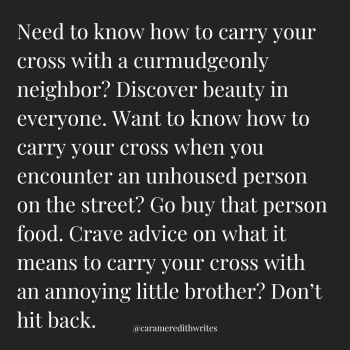But Jesus always hits them at the flaw at the center of their system. Their way of being in the world -- the way of sacrifice -- tended to lack compassion. Tended to be blind to the needs of real people around them, like tax collectors and that categorical catch-all for every undesirable: sinners.
Jesus offers them a way out: learn the difference between mercy and sacrifice. From the sound of it, you would think the two are easy to separate and distinguish. But obviously, it's much more subtle than that. From the outside, mercy and sacrifice can look exactly the same. But from the inside, the motivation can be quite opposite. Sacrifice is a means of getting something in return. Mercy is an offering that is given out of gratitude and compassion, with no strings attached.
Rather than saying, "I should love people more," I've found it more beneficial to say, "I can love people more." It keeps the whole love thing where it belongs: rooted and grounded in love. That simple statement, "I desire mercy, not sacrifice," means it's possible to let love be my motivation, not guilt or obligation or sacrifice. It's actually quite freeing. When you find yourself unloving, please don't try to motivate yourself by saying, "I should be more loving." Rather, know deep down that God does not desire sacrifice, God desires mercy. God desires loving-kindness and compassion.
Rilke's Book of Hours contains one of his wonderful poems that captures for me the difference between mercy and sacrifice.
I believe in all that has never been spoken.
I want to free what waits within me
so that what no one has dared to wish for
may for once spring clear
without my contriving.
If this is arrogant, God, forgive me,
but this is what I need to say.
May what I do flow from me like a river,
no forcing and no holding back,
the way it is with children.
Then in these swelling and ebbing currents,
these deepening tides moving out, returning,
I will sing you as no one ever has,
streaming through widening channels
into the open sea.
Mercy, compassion, is what for once springs clear without my contriving. Sacrifice is our way of contriving. Loving-kindness is what flows out of us, out of the Spirit of God in us, like a river, no forcing and no holding back, the way it is with children. No sacrifice will do that. Although mercy and compassion may lead one to offer what seems to others to be a great sacrifice, inside it feels differently. It comes out of gratitude, loving-kindness, compassion.
I think Jesus was getting at this difference when he told his disciples, "No longer do I call you servants...but I have called you friends" (John 15:15). Sue Monk Kidd writes:
What Jesus needs are companions willing to pick up where he leaves off, partners able to adopt his ministry as their own...What he needs are not servants but friends...But I wonder if some of us would not really rather decline the honor and stay put in the servants' quarters. There is a lot to be said for being a servant, after all. Someone else makes the decisions and carries the responsibility. Someone else runs the show. All I have to do is follow orders. I can be loyal and reliable and polish the silver better than anyone else; I can do more that I am asked and never complain, but when push comes to shove I can hang up my apron and go home...The slave simply does what he or she is commanded to do without emotional involvement or ownership, but that is not the kind of relationship Jesus wants. He wants colleagues, people who will work with him, not for him. He wants partners in compassion.
"I desire mercy, and not sacrifice."
Some people say that to make a church go many people have to make many sacrifices. That's one way to make it work. But I suggest another way. To make a church go we only need to offer our compassion, our loving-kindness, our mercy. It's the only way we won't get bound up in the many strings that can get attached to sacrifices and trip us up.
Next Sunday is stewardship Sunday. Stewardship is often talked about as a sacrifice. I invite you to think of it differently this year. As a mercy. As a gift given, a promise made, not out of obligation, but out of gratitude and love, for God, for one another, for the things God has done here and the things God will do here in the future.
So let us do as Jesus suggests, "Go and learn what this means, ‘I desire mercy, and not sacrifice.'" Amen.
This sermon was preached on November 1, 2009 at Peoples Presbyterian Church in Denver, CO and is reprinted with permission.
Tim Mooney is a Presbyterian Pastor, a Spiritual Director, and a Fine Artist. Much of Rev. Mooney's artwork has been created for and in various liturgical settings. His work can be seen at www.timmooneystudio.com.




